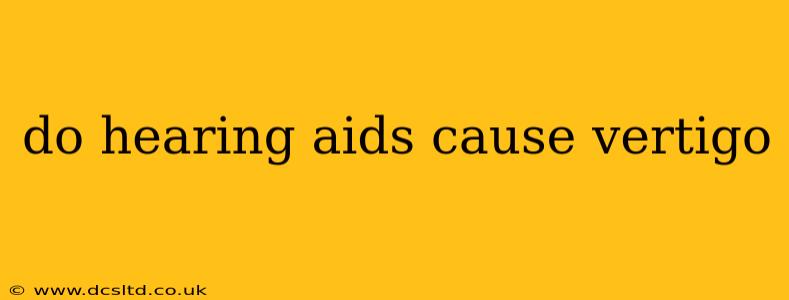Vertigo, that unsettling sensation of spinning or the room moving around you, can be a debilitating experience. It's natural to worry about the potential side effects of any medical device, and hearing aids are no exception. So, do hearing aids cause vertigo? The short answer is: not usually, but it's a possibility, and understanding the reasons why is crucial.
While hearing aids themselves don't directly cause vertigo, certain factors related to their use or underlying conditions can contribute to experiencing dizziness or vertigo. Let's delve deeper into the potential connections.
Why Might Someone Experience Dizziness or Vertigo While Using Hearing Aids?
Several factors can lead to a perceived link between hearing aid use and vertigo, even if there's no direct causal relationship:
1. Underlying Inner Ear Problems:
This is perhaps the most important point. Many individuals who experience vertigo also have underlying inner ear problems like Meniere's disease or benign paroxysmal positional vertigo (BPPV). These conditions can cause dizziness independent of hearing aids. The onset of dizziness around the time of getting a hearing aid may be coincidental, with the underlying condition already present.
2. Sudden Changes in Auditory Input:
Hearing aids amplify sounds, and this sudden increase in auditory stimulation can sometimes initially overwhelm the brain. This can lead to feelings of disorientation or dizziness, especially in the initial days or weeks of use. As the brain adapts to the enhanced sound, this feeling usually subsides. Proper fitting and gradual adjustment periods are crucial to mitigate this.
3. Improper Hearing Aid Fitting:
A poorly fitted hearing aid can create discomfort and pressure in the ear canal, potentially triggering feelings of dizziness or imbalance. This is particularly true if the hearing aid is too large or improperly inserted. A qualified audiologist should always ensure a comfortable and secure fit.
4. Ear Infections or Blockages:
Ear infections or blockages can directly affect the inner ear and vestibular system, leading to vertigo. If a hearing aid is worn during an ear infection, it might exacerbate the problem, leading to a perceived link between the device and dizziness. Regular ear check-ups are essential.
5. Psychological Factors:
Anxiety or the fear of falling (often associated with dizziness) can contribute to a heightened perception of dizziness, especially in new hearing aid users. This doesn't mean the hearing aid causes the anxiety, but the new experience can amplify existing concerns.
What to Do If You Experience Dizziness with Your Hearing Aids:
If you experience dizziness while using hearing aids, don't panic. Take the following steps:
- Consult your audiologist: This is the most crucial step. They can assess the fit, adjust settings, and rule out any issues with the hearing aid itself.
- Discuss your medical history: Mention any previous experiences with vertigo or inner ear problems.
- Keep a diary: Note when dizziness occurs, the intensity, and any other associated symptoms. This will help your audiologist pinpoint potential causes.
- Consider a gradual adjustment period: If you're a new user, gradually increase the hearing aid's use time to allow your brain to adapt.
Can Specific Types of Hearing Aids Cause More Vertigo?
There's no evidence suggesting that one type of hearing aid (e.g., behind-the-ear, in-the-ear) is inherently more likely to cause vertigo than another. The fit, the user's underlying health, and the adjustment process are more significant factors.
Conclusion:
While hearing aids themselves rarely cause vertigo, several related factors can contribute to dizziness. Proper fitting, careful adjustment, and open communication with your audiologist are key to minimizing this risk. If you experience vertigo, seek professional medical advice to rule out any underlying medical conditions. Remember, a comfortable and properly functioning hearing aid can significantly improve your quality of life without causing dizziness.
